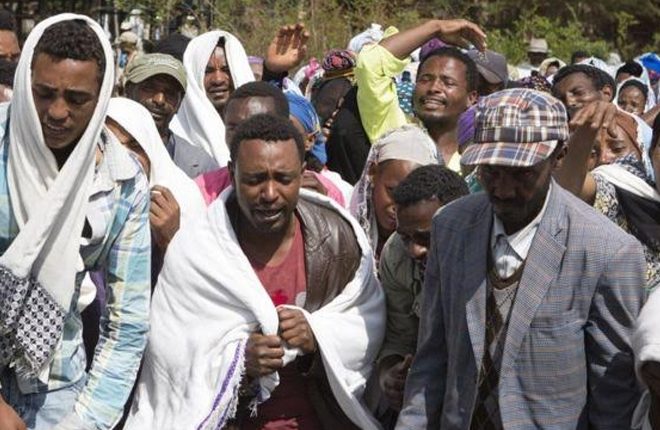Ethiopian journalists should be freed, says CPJ
(BBC) Two journalists arrested in Ethiopia this month should be freed, an international press freedom group says.
The detentions come amid deadly protests over a plan to expand the capital’s administrative control into the Oromia region, the Committee to Protect Journalists (CPJ) said.
The government has accused Oromo protesters of links with terror groups.
The country criminalises any reporting that authorities consider an encouragement to such groups.
‘Hollow achievement’
The CPJ said two journalists were detained within a week of each other.
Getachew Shiferaw, who edits the online paper Negere Ethiopia, was arrested on Friday and the next day a court granted permission for him to be held for 28 days for interrogation, the CPJ said in a statement.
On 19 December, Fikadu Mirkana, a news anchor at the state-run broadcaster Oromia Radio and TV, who also was arrested at his home in the capital, Addis Ababa, the press watchdog said.
“Ethiopia prides itself on development, but economic growth is a hollow achievement if the public does not enjoy fundamental human rights such as the right to receive and share information and divergent viewpoints,” said Sue Valentine, the CPJ’s Africa programme co-ordinator.
The CPJ added that four Ethiopian bloggers cleared of terrorism charges in October have been summoned to appear in court on Wednesday as the prosecution is appealing their acquittal.
They were part of a group know the Zone 9 bloggers and their case inspired a sustained online campaign for their release by activists in Ethiopia and beyond.
Oromia is Ethiopia’s largest region, surrounding Addis Ababa.
Protesters say they fear losing their land and cultural persecution if what has been dubbed a “master plan” to integrate parts of Oromia into Addis Ababa go ahead.
The government says other views are being taken into consideration.
Officials say five people and an undisclosed number of security personnel have died in the latest protests.
But US-based Human Rights Watch says activists say the security forces have fired on the demonstrations, killing at least 75 protesters.
The BBC’s Africa correspondent Alistair Leithhead says demonstrations are rare in Ethiopia and the current Oromo anger over urban planning is an expression of much older complaints over a lack of political and economic inclusion.
At the last census in 2007, the Oromo made up Ethiopia’s biggest ethnic group, at about 25 million people out of a population at the time of nearly 74 million.

